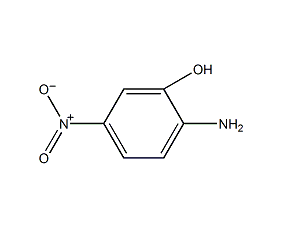
Structural formula
| Business number | 03E6 |
|---|---|
| Molecular formula | C6H6N2O3 |
| Molecular weight | 154.12 |
| label |
5-nitro-2-aminophenol, 2-amino-5-nitrophenol, 2-Hydroxy-4-nitroanilinol, 2-hydroxy-4-nitroaniline, 2-amino-5-nitrophenol, 2-Amino-5-nirtophenol, 2-amino-5-nitro-pheno, 3-hydroxy-4-aminonitrobenzene, 3-nitro-6-aminophenol, ncic55970, rodolyba, ursolyellowbrowna, CI 76535, aromatic compounds |
Numbering system
CAS number:121-88-0
MDL number:MFCD00007692
EINECS number:204-503-8
RTECS number:SJ6302500
BRN number:972974
PubChem number:24858130
Physical property data
1. Properties: light brown needle-like crystals.
2. Melting point (℃): 207-208
3. Solubility: Slightly soluble in water, soluble in ethanol, ether and concentrated inorganic acids.
Toxicological data
1. Acute toxicity: Rat oral LD50:>4gm/kg
Rat peritoneal cavity LD50:>800mg/kg
2. Other multiple dose toxicity: Rat oral TDLO: 3756mg/kg/16D-I
Rat oral TDLO: 52gm/kg/13W-I
Mouse oral TDLO: 7500mg/kg/ 16D-I
Oral TDLO in mice: 104gm/kg/13W-I
3. Oncogenic toxicity: Oral TDLO in rats: 51500mg/kg/2Y-C
4. Mutagenic toxicity: Salmonella mutation test system: 20ug/plate
Mouse mammalian somatic cell mutation test system: 25mg/L
Hamster ovary microorganisms Group mutation analysis test system: 905mg/L
Hamster lung cell mutation test system: 1mg/L
Hamster ovary double chromosome exchange test system: 1240mg/L
Ecological data
None
Molecular structure data
1. Molar refractive index: 38.91
2. Molar volume (cm3/mol): 101.9
3. Isotonic specific volume (90.2K): 303.6
4. Surface tension (dyne/cm) 78.5
5. Dielectric constant:
6. Dipole moment (10-24cm 3):
7. Polarizability: 15.42
Compute chemical data
1. Reference value for hydrophobic parameter calculation (XlogP): None
2. Number of hydrogen bond donors: 2
3. Hydrogen bond��Number of receptors: 4
4. Number of rotatable chemical bonds: 0
5. Number of tautomers: 7
6. Topological molecules Polar surface area 92.1
7. Number of heavy atoms: 11
8. Surface charge: 0
9. Complexity: 156
10. Number of isotope atoms: 0
11. Number of determined atomic stereocenters: 0
12. Number of uncertain atomic stereocenters: 0
13. Determined number of stereocenters of chemical bonds: 0
14. Uncertain number of stereocenters of chemical bonds: 0
15. Number of covalent bond units: 1
Properties and stability
Toxic. Splashing on skin can cause eczema.
Storage method
Store in a dry, well-ventilated place. Pay attention to fire prevention and moisture prevention.
Synthesis method
It is obtained by diazotization, triazation (condensation) and hydrolysis of p-nitroaniline.
Purpose
Dye intermediates. Used to produce neutral rosé BL. It can also produce metal complex dyes, reactive black, leather spray red GL, leather spray black RL, solvent red BL, solvent red KL, etc.

 微信扫一扫打赏
微信扫一扫打赏

